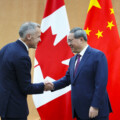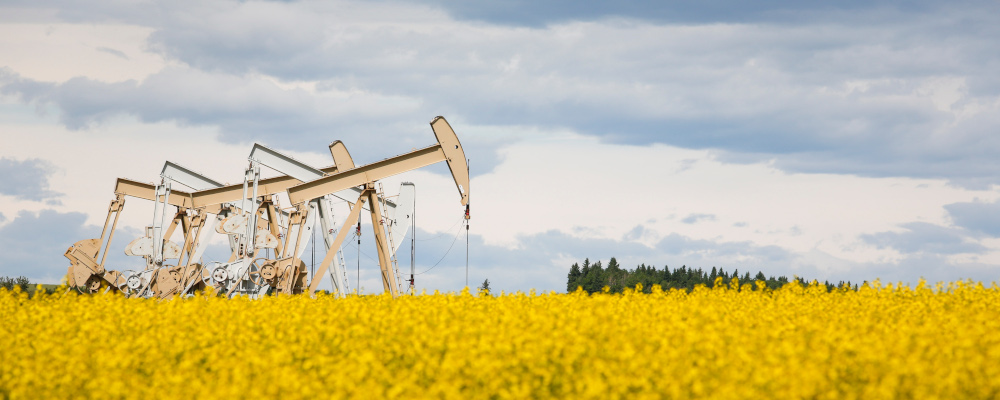For better or worse, Alberta’s government relies heavily on oil and gas royalty revenues. Over one-third of the province’s revenues came from this source last year. And this year, despite lower prices, the government anticipates its resource revenue share will still exceed one-quarter.
It’s little wonder why anything that poses risks to this sector, however small, is met with stiff resistance.
“Let me be perfectly clear: We are not going to be shutting down our oil and natural gas industry,” Premier Smith recently said. And that was in response to an almost meaningless piece of federal legislation to create advisory councils to promote “sustainable jobs” (whatever that means).

The province is not against reducing emissions. Alberta was the first in Canada to enact carbon pricing over a decade and a half ago. Even Premier Smith supports moving to net-zero emissions by 2050, as do major oil and gas companies.
But Alberta’s government naturally fears policies that may incur unnecessary costs, so it wants a hand in crafting them.
Can net zero be achieved without shutting down oil and gas? And what does such a goal mean for Alberta’s finances?
It turns out that net zero does not have to shut down oil and gas or ruin Alberta’s finances.
There will be costs, but manageable ones. The big risks come not from Canadian actions but from global ones.
Canada’s Energy Future to 2050
Every few years, the Canadian energy regulator issues a detailed analysis of supply and demand conditions for major energy markets. This provides vital insight. Last week, the regulator published its 2023 estimates. These included a scenario based on current policies and others with net zero by 2050, either globally or in Canada.
I illustrate the key results below for oil prices and production.
Assuming no new policies that affect oil production are enacted, the regulator projects Canadian production (most of which is in Alberta) rises to approximately 6.5 million barrels per day before levelling off.
For Canada to achieve net-zero emissions, more action is needed, which lowers producer revenues, investment, and production. Oil production is expected to peak at 6 million barrels per day around 2030 and decline to 4 million by 2050, roughly the same as in 2015.This probably overstates the consequences since the regulator includes in their analysis inefficient and inadvisable federal policies like the emissions cap.
But international policies matter most for our energy future. The regulator projects that if the world achieves net zero by 2050, then prices would collapse, reaching nearly $20 per barrel by 2050, resulting in significant and rapid reductions in Canadian oil production after 2030.
Obviously, this would have severe financial implications for Alberta’s provincial government. This is not a likely scenario, though. Even if the world achieves net zero by then, prices need not fall. If supply-side constraints are enacted elsewhere, for example, then global oil production and emissions could decline while prices increase. Canadian oil production need not fall as much if we’re among the last barrels produced.
In any case, let’s narrow our focus to domestic policies within Canada since that’s what we can control. What does achieving net zero imply for Alberta’s finances?
The Future of Alberta’s Resource Revenues
If you had asked me last month what my baseline scenario was, I would have projected resource revenues, adjusted for inflation, to average $14 billion from now until the middle of the next decade, rising slowly and stabilizing around $15 billion thereafter.All estimates for Alberta’s budget come from updated versions of my own detailed projection model. You can read details here or here.
This all changed following the release of the Canada Energy Future report for 2023, and two key points stood out.
First, the energy regulator assumed higher prices than the Alberta government forecast for the next few years. Second, production declines faster than previously thought. If a net-zero goal is met, Alberta may produce 3.5 million barrels per day in 2050 instead of 5.5 million if no new policies are enacted.
The government’s resource revenues will decrease, but a surprising amount remains. I estimate that resource revenues, adjusted for inflation, could remain above $10 billion for the entire transition. That’s massive. In per person terms, that is roughly $2,700 per person in resource revenues flowing to the government—equivalent to roughly $14 billion today, continuing for at least a quarter century.
Simply put: Alberta’s oil and gas bonanza could last at least another generation.
This doesn’t mean achieving net-zero emissions is costless. Far from it.
I estimate cumulative royalties will be $140 billion lower (in today’s dollars) between now and 2050 compared to the regulator’s “current measures” scenario, which assumes no future policy changes. To be clear, there are significant uncertainties and simplifying assumptions here, so take these estimates with a grain of salt. (But they demonstrate plausible magnitudes.)
That’s a lot, of course, but for context, it’s equivalent to approximately $800 per person per year. This is much smaller than Alberta’s tax advantage. Currently, Albertans pay $4,200 less per capita than they would if the province matched the next lowest tax province, Ontario.
So while achieving net zero comes with a cost, it is entirely manageable. If Alberta saved just a little more of its resource revenues today—say, by raising revenues or restraining spending growth and saving its larger surpluses in the province’s Heritage Fund—higher investment returns would more than cover the coming drop in resource revenues.
While the oil revenue bonanza could last for at least another generation, the path ahead is not without risks. The regulator’s projections show a potential trend, not the large swings around it. The province remains firmly on its familiar revenue rollercoaster, and the financial risks to the province from stronger global climate action have never been clearer. Saving more would both dampen volatility and help secure the province’s fiscal future, whatever scenario unfolds.
Alberta finds itself at an interesting crossroad. How bumpy the coming fiscal ride is—and how long the bonanza lasts—depends entirely on the province’s own choices.
Recommended for You

The Weekly Wrap: Stop painting Alberta as the villain of Canada

The Week in Polling: Majority of Canadians want the Alberta-B.C. pipeline; Optimism about the Carney government drops; 87 percent of Canadians concerned about the state of housing

‘An approach that lacks principles’: The Roundtable on Canada’s confusing China reset and the lack of scrutiny on Carney

Why I flew to Israel for the hostage release




